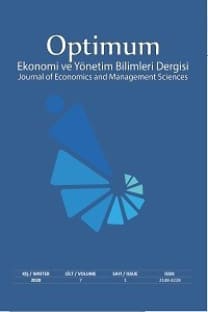Bilgi ve İletişim Teknolojilerinin Türkiye’nin İhracat Performansına Etkisi
Bilgi ve İletişim Teknolojileri (BİT), İhracat, Çekim modeli, Türkiye
The Impact of Information and Communication Technologies on Turkey’s Exports Performance
___
- Ahmad, N. A., Ismail, N. W. ve Hook, L. S. (2011). The Role of ICT Infrastructure on Malaysian Trade. International Journal of Economics and Management, 5(1), 140-148.
- Artan, S. ve Kalaycı, C. (2009). İnternetin Uluslararası Ticaret Üzerindeki Etkileri: OECD Ülkeleri Örneği. Doğuş Üniversitesi Dergisi, 10(2), 175-187.
- Baier, S. L. ve Bergstrand, J. H. (2019), Database on Economic Integration Agreements. https://www3.nd.edu/~jbergstr/DataEIAsApril2017/EIADatabaseApril2017.zip/, (erişim tarihi: 03.10.2019).
- Bilgiç, E. (2019). İnternet Teknolojisinin Türk Hizmet İhracatı Üzerindeki Etkisi. Başkent Üniversitesi Ticari Bilimler Fakültesi Dergisi, 3(1), 22-36.
- CEPII (2019). GeoDist Dataset and Gravity Dataset. http://www.cepii.fr/cepii/en/bdd_modele/bdd.asp, (erişim tarihi:02.10.2019).
- Choi, C. (2010). The Effect of the Internet on Service Trade. Economics Letters, 109(2), 102-104.
- Clarke, G. R. G. ve Wallsten, S. J. (2006). Has the Internet Increased Trade? Developed and Developing Country Evidence. Economic Inquiry, 44(3), 465-484.
- Crespo, E. R., Marco, R. ve Billon, M. (2018). ICTs Impacts on Trade: A Comparative Dynamic Analysis for Internet, Mobile Phones and Broadband. Asia-Pacific Journal of Accounting & Economics, 25, 1-15.
- Crespo, E. R. ve Zarzoso, I. M. (2019). The Effect of ICT on Trade: Does Product Complexity Matter?. Telematics and Informatic, 41, 182-196.
- Dünya Bankası (2019). World Bank, World Development Indicators (WDI). https://databank.worldbank.org/source/world-development-indicators/, (erişim tarihi: 03.10.2019).
- Dünya Ticaret Örgütü (2019). World Trade Organization (WTO). https://data.wto.org/, (erişim tarihi: 03.10.2019).
- Freund, C. ve Weinhold, D. (2002). The Internet and international trade in services. American Economic Review, 92(2), 236-240.
- Freund, C. L. ve Weinhold, D. (2004). The effect of the Internet on international trade. Journal of international economics, 62(1), 171-189.
- Hassani, F. H., Torabi, T. ve Gharibzadeh, S. (2015). Effect of Information and Communications Technology on Trade Flows Using Gravity Model. Asia Pasific Journal of Advanced Business and Social Studies, 1(1), 30-38.
- International Telecommunication Union (ITU) (2019). Measuring the information society reports: 2007-2017. ITU. Switzerland.
- Joseph, K. J. (2002). Growth of ICT and ICT for development: Realities of the Myths of the Indian Experience. WIDER Discussion Paper, 78.
- Karagöz, K. (2007). Bilgi İletişim Teknolojilerindeki Gelişmenin İhracata Etkisi: Türkiye için Ampirik Bir Analiz. Maliye Dergisi, (153), 214-223.
- Karamollaoğlu, N. ve Tuncay, B. (2018). ICT Characteristics and Trade. Anemon Muş Alparslan Üniversitesi Sosyal Bilimler Dergisi, 6(18), 321-324.
- Lal, K. (1999). Information Technology and Exports: A Case Study of Indian Garments Manufacturing Enterprises. ZEF Discussion Papers on Development Policy, 15.
- Lin, F. (2015). Estimating the Effect of the Internet on International Trade. The Journal of International Trade & Economic Development, 24(3), 409-428.
- Liu, L. ve Nath, H. K. (2013). Information and Communications Technology and Trade in Emerging Market Economies. Emerging Markets Finance and Trade, 49(6), 67-87.
- Mattes, A., Meinen, P. ve Pavel, F. (2012). Goods Follow Bytes: The Impact of ICT on EU Trade. German Institute for Economic Research Discussion Papers, 1182.
- Melemen, M. (2006). Türk İhracat Şirketlerine İnternetin Katkıları Üzerine Bir Saha Araştırması. Öneri Dergisi, 7(25), 193-198.
- Nath, H. K. ve Liu, L. (2017). Information and Communications Technology (ICT) and Service Trade. Information Economics and Policy, 41, 81-87.
- Özcan, B. (2018). Information and Communications Technology (ICT) and International Trade: Evidence from Turkey. Eurasian Economic Review, 8(1), 93-113.
- Park, M. H. ve Koo, W. W. (2005). Recent Development in Infrastructure and Its Impact on Agricultural and Non-agricultural Trade. Annual Meeting for the American Agricultural Economics Association’de sunulan tebliğ. Rhode Island, 24–27 Temmuz.
- Pastpipatkul, P. ve Saeor, S. (2018). Analysis of Relationship Between Digital Technology and International Trade of Thailand. International Journal of Intelligent Technologies and Applied Statistics, 11(3), 155-166.
- Şeker, A. (2017). Uluslararası Ticarette İnternet Kullanımının Rolü: Türkiye Örneği. Ege Akademik Bakış, 17(1), 75-88.
- Şen, A., Çelebioğlu, F. ve Altay, H. (2009). The Effects of Knowledge and Technology Variables on Terms of Trade. Süleyman Demirel Üniversitesi İktisadi ve İdari Bilimler Fakültesi Dergisi, 14 (2), 361-374.
- Tay, C. (2018). The Impact of Information and Communication Technologies on Bilateral Trade in Services. Int. J. Services Operations and Informatics, 9(1), 40-61.
- Türkcan, K. (2014). Investigating the Role of Extensive Margin, Intensive Margin, Price and Quantity Components on Turkey’s Export Growth during 1998-2011. Turkish Economic Association Discussion Paper, No: 2. Türkiye İstatistik Kurumu (TÜİK) (2019). Dış Ticaret İstatistikleri.
- Türkcan, K. ve Pişkin, E. (2014). Türkiye’nin İhracat Artışında Yaygın ve Yoğun Ticaretin Rolü. İktisat İşletme ve Finans, 29(336), 83-116.
- Türkcan, K. ve Pişkin, E. (2016). Ticaret Anlaşmalarının Türkiye’nin İhracat Dinamiğine Etkisi: Yaygın ve Yoğun Ticaret. Ekonomik Yaklaşım, 27(99), 17-55.
- Vemuri, V. K. ve Siddiqi, S. (2009). Impact of Commercialization of the Internet on International Trade: A Panel Study Using the Extended Gravity Model. The International Trade Journal, 23(4), 458-484.
- Visser, R. (2019). The Effect of the Internet on the Margins of Trade. Information Economics and Policy, 46, 41-54.
- Wang, M. L. ve Choi, C. H. (2019). “How Information and Communication Technology Affect International Trade: A Comparative Analysis of BRICS Countries”. Information Technology for Development, 25(3), 455-474.
- Yayın Aralığı: Yılda 2 Sayı
- Başlangıç: 2014
- Yayıncı: -
Lojistik Yönetiminin Dijital Dönüşümü: Akıllı Lojistik Üzerine Sistematik Literatür Haritalaması
Üniversite Öğrencilerinin Gelecekleriyle İlgili Kaygı ve Beklentilerinin Belirlenmesi
Burhanettin ZENGİN, Ümit ŞENGEL
Lübnan’da Siyasal Kurumların Yeniden İnşası: Çoğunluk Sisteminden Nispi Temsile
Tahsin YAMAK, Tuba YILDIZ, Emre SAYGIN
Fatma SÖNMEZ ÇAKIR, Zafer ADIGÜZEL
Almanya’nın Kısa Tarihi Mary Fulbrook, İstanbul: Boğaziçi Üniversitesi Yayınevi, 263 sayfa.
Genel Politik Etkinlik Ölçeği: Sağlık Çalışanlarında Bir Ölçek Geliştirme Çalışması
Hilal KUŞCU KARATEPE, Derya ATİK
Küreselleşme Yaşam Tatminini Nasıl Açıklar?
Didem PEKKURNAZ, Zeynep ELİTAŞ
2008 Krizi Sektörlerin Sistematik Riskini Etkiledi mi? Türkiye Örneği
Metin TETİK, E. Tuğba CİĞEROĞLU, Eser YEŞİLDAĞ
Yabancılar ve Uluslararası Koruma Kanunu ile Göç İdaresi Bağlamında Türkiye’nin Yeni Göç Siyaseti
